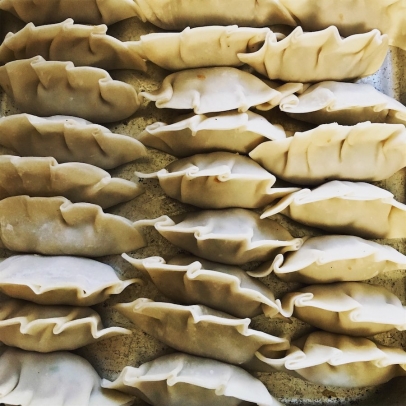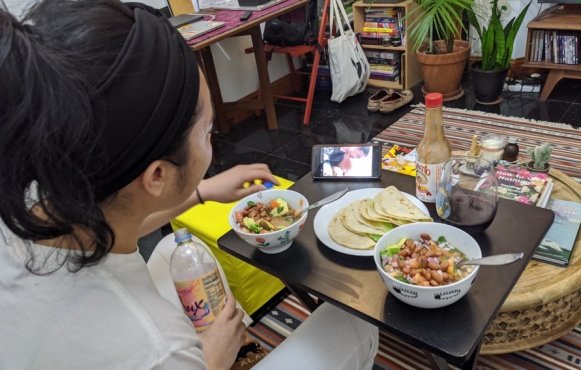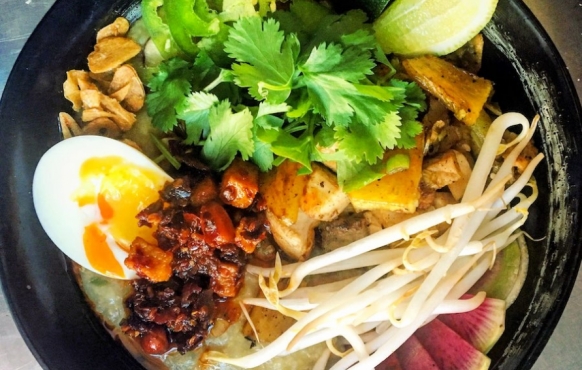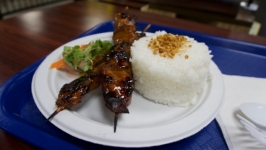
The lamb chunks are still crispy, courtesy of a light cornstarch crust, when Mike Underwood tosses them in a Sichuan-inspired reduction, fragrant with fermented bean paste, chilies, garlic, vinegar and freshly ground spices. A few days before, Mike made a Chinese congee, rich with chunks of chicken, fried garlic, watermelon radish, bean sprouts and Chinese Lao Gan Ma chili crisp. Recently, Mike—the farmers market manager for Sun Fed Beef & Pork—has been on a Sichuanese-inspired culinary kick.
Earlier in April he and his partner, Lisa Starikov, a culinary professional, made an epic shopping trip to a Chinese supermarket in Queens, bringing home a huge haul of Chinese ingredients. Their goal was to support the local Chinese community, hit hard by the coronavirus panic.
A lot has changed since then. Adventurous grocery shopping trips have halted for now. Dining out, postponed for the foreseeable future.
“At least for right now, the farmers markets are considered an essential business. And I’m thankful for that,” Mike said. As the New York City manager of a small upstate meat farm, he has seen procedures at the farmers markets change drastically in recent weeks. Gloves are now mandatory. Customers are forbidden to pick out their own produce and at Sun Fed, a plexiglass shield is being installed to separate the customers from the vendor. Before the pandemic, Mike spent his work week selling at farmers markets. Now, he works from home five or six days a week, except for one market shift at Jackson Heights, Queens.
But Mike is also in a unique position. Working at the markets allows him access to a steady supply of fresh meat and produce. A capable cook, Mike has taken advantage of the increased home time to make a variety of dishes, conjuring up everything from Chinese rice cakes with preserved kale and Benton’s bacon to pork and scallion dumplings, all in the confines of his Jackson Heights apartment. Because of the pandemic, Mike has paid more attention than usual to utilizing leftovers, avoiding unnecessary shopping trips whenever possible.
For some New Yorkers, cooking has now become a balance of rationing and flavor. Alec Bernal, a Los Angeles transplant, has lived in Brooklyn since 2014. He’s a media professional, having worked on film sets and various media companies. Currently, he’s on “emergency” paid leave from work and is self-quarantined at home with his fiancé, Angeline Quintilla. Earlier this month, a few people in Angeline’s work building tested positive for coronavirus, prompting her boss to send everyone home. However, Alec has recently been deemed an essential worker by his company. Currently, he is in the process of requesting more paid time off to continue working at home.
Daily meals are now carefully planned by Alec, something that’s very different than before the pandemic. Alec is focused on cooking simple yet filling meals with affordable ingredients like beans, Maseca instant masa and fresh vegetables. Meat and dairy are rare now, rationed to save money. Much of Alec’s cooking relies on his Mexican American heritage, making dishes like chorizo and egg burritos, arroz con leche, quesadillas and slow-cooked pinto beans. Grocery shopping has also changed. Now, Alec buys in bulk, going to the store twice a week for fresh ingredients, and avoids unnecessary foot traffic when possible.
But one dish that has remained steady in Alec’s repertoire is his mother’s recipe for slow-cooked pinto beans. As a child coming home from school, his mother would serve him a hot bowl, still steaming from the slow cooker, topped with cheese and diced onions. He’s added his own twists since then, garnishing them with tomatoes and avocado.
“When I moved out on my own, my mother taught me this recipe,” Alec said. “It reminds me of home.”






